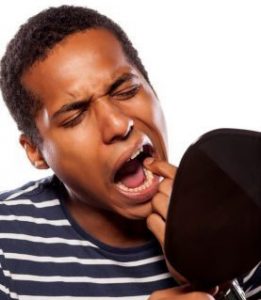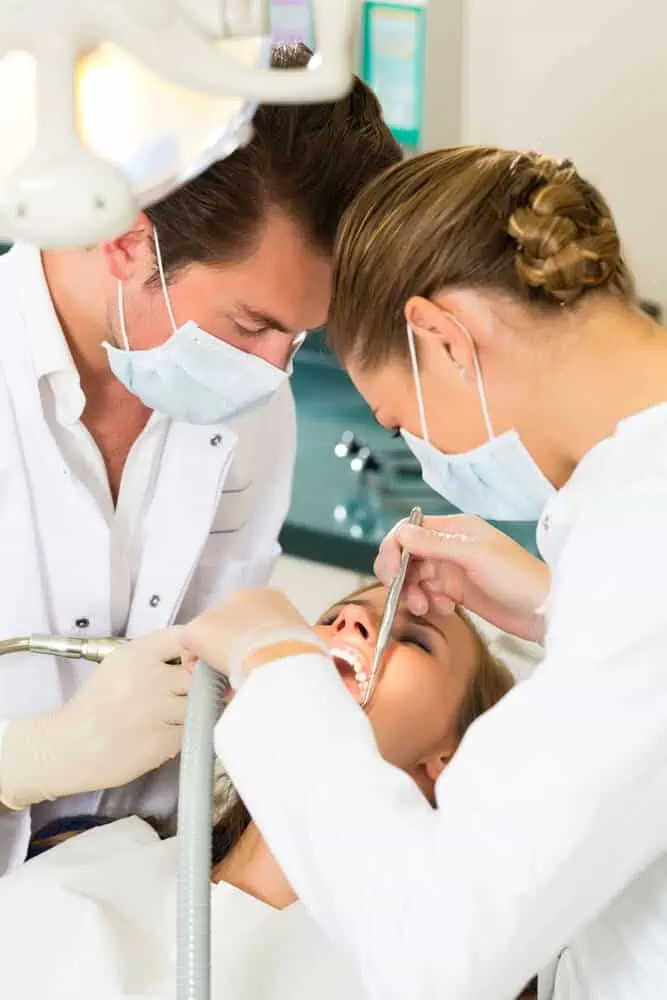Are you worried because you have a loose tooth? There are many things that can cause loose teeth in adults, but regardless of the cause or which tooth it is, it is something that should be addressed right away.
Even though everyone has had the experience of a loose tooth as a child, once your adult teeth come in they’re supposed to stay securely in place for the rest of your life. Unfortunately, many adults do end up having a loose tooth for various reasons, and of course, they don’t have a natural tooth ready to take it’s place.
At Dentaly.org we want to answer your questions and give you advice on how to care for your loose tooth so that you have the best dental health possible. In this article we will discuss:
- Different causes of loose permanent teeth
- Other symptoms associated with those causes
- Treatments
- Preventive measures that you can take to avoid having a loose tooth in the first place
No matter what the cause or severity, as soon as you notice your teeth feel loose, or even find just one wiggly tooth, you should contact a dentist right away. Although there are some things you can do at home to prevent loose teeth or care for them, the only way to ensure a full recovery is by receiving treatment from a professional.
Why is my adult tooth loose?
Adults might lose molars or front teeth through disease, injury, repeated stress, and weakened bone material, but in the end it’s mostly due to degradation or damage to bone and tissue. If you are wondering why your tooth moves, have a look at these common causes:
Periodontitis
Periodontitis, or gum disease, is by far the most common cause of loose teeth in adults. According to the CDC, 47.2% of adults over 30 have gum disease resulting from poor dental hygiene, which is sometimes brought on by depression or other mental health concerns. When plaque on your teeth is not removed by brushing and flossing, it can harden into what is known as tartar.


This hardened material can build up and slowly separate the gum tissue at the base of your teeth. Tartar contains bacteria that, as it accumulates and slowly separates gum tissue, causes an infection within your gums. Some other signs of periodontitis include:
- Swollen gums
- Bleeding gums
- Pus between teeth and gums
- Gum recession
- Food is easily stuck between gums and teeth
If identified and treated by a dentist fairly early, these symptoms can be treated and your gum health can be restored, meaning your loose tooth can tighten back up without surgery. However, if left unnoticed until an advanced stage, the bone and tissue supporting your teeth will become weaker and require more drastic treatment in order to reverse the effects.
Injury
Sometimes teeth can be knocked loose due to an impact like a sports injury or a car accident. Such an accident can often chip or crack a tooth or possibly break it off entirely. However, sometimes a certain angle of impact will only damage the underlying tissue and bone, resulting in a loose tooth.
If you have suffered such an injury to the mouth you should call a dentist right away for advice on how to proceed. If the injury is severe and your tooth is very loose, then you will want to visit the dentist’s office as soon as possible.
Many general dentists can perform emergency treatments, but you may also want to consider specialists like periodontists (gum specialists) or endodontists (root canal specialists).


Call 866-383-0748 to find a dentist near you, if you don’t have a regular dentist you can visit. You’ll speak to a live operator, 24/7, who can connect you to a dentist in your area.
Bruxism
Teeth grinding, formally known as bruxism, can also slowly degrade the bone and soft tissue around your teeth over a long period of time. This occurs when a person unconsciously clenches their jaw, sometimes moving it from side to side and often while asleep. Sometimes people will also grind their teeth while awake. This can be caused by many different factors including:
- Stress (by far the most common cause)
- Sleep disorders
- Misalignment of teeth
- Use of antidepressants
- Neurological conditions like Huntington’s disease
- Smoking
- Drinking alcohol
- Use of stimulants
Bruxism is a key cause of loose teeth. It can also cause several other issues, from aching across the jaw and face to cracked and flattened teeth that require multiple crowns and veneers.
High-stress jobs are the most common cause of a clenched jaw, but uncertainty over the past year has also increased teeth grinding. Stress releases adrenaline, which increases the tension in muscles as part of a fight or flight reaction. This causes the jaw to tense, resulting in teeth grinding.
Dr. Kirrin Punia, Fresh Smile Clinic
No matter what the cause, the symptoms are the same and can usually be identified before bruxism causes your teeth to come loose. Symptoms include:
- Headaches
- Earaches or tinnitus
- Stiffness and muscle pain around the jaw
- Pain around neck and shoulders
- Disrupted sleep
- Bleeding gums
Wearing a night guard can help prevent teeth grinding. Check out our full article on night guards here.
Other medical conditions that can cause a loose adult tooth
Sometimes teeth can come loose as a result of other medical conditions. Most commonly this is due to a weakening of the bone tissue as a result of osteoporosis, or even pregnancy. Diabetes also contributes to more severe periodontitis as it slows healing and increases vulnerability to infections.


Can a loose tooth be saved at home?
There is no procedure for tightening loose teeth at home. The best thing to do is to contact a dentist for advice and treatment.
For early periodontitis you may be instructed to clean out the bacteria in your mouth with regular salt water rinses and hope that the bone and tissue recover and your tooth tightens after a few weeks. However, before you try this you should confirm with your dentist that you don’t need more urgent treatment.
If you want to know how to save a loose tooth from falling out, it’s fairly simple. Once you have contacted the dentist for a consultation, limit your diet to liquids and only the softest solids and avoid chewing with the loose tooth whenever possible. This will help preserve as much healthy tissue as possible while you wait to see a dentist.
How to fix teeth that are loose from gum disease
Regardless of the reason for your loosening teeth, your best course of action for treatment will always be contacting a dentist for advice and possibly scheduling an emergency dental appointment. Treatments for loose teeth can vary depending on the cause and severity of your condition but should always be carried out under the supervision of a medical professional.
Non-surgical treatments
If the cause is identified early as periodontitis, non-surgical treatment can be enough to reverse the spread of gum disease, allowing your gums to heal naturally. These treatments include:
- Scaling: Removal of the built up tartar from the surface of the tooth and beneath the gums. This is performed by a dentist using a hand scaler and an ultrasonic cleaner.
- Root planing: Your dentist smooths the surface of the tooth to reduce the possibility of further accumulation and tartar and bacteria.
- Antibiotics: These are used to stop the spread of bacterial infection which damages the bone and tissue supporting your teeth.
After these treatments, your gums will likely be able to fully recover moving forward, as long as they receive the proper care. However, if your loose tooth is the result of a more serious condition, then you will most likely need surgery to restore your smile.
Surgical treatments
For loose adult teeth resulting from advanced periodontitis, injury, or bruxism, you will probably require surgery in which the dentist will both remove tartar and bacterial buildup as well as perform one of several procedures to enable healing and regeneration of the bone and soft tissue in your jaw. Surgeries for periodontitis include:


Flap surgery
Flap surgery is also known as pocket reduction surgery. The dentist lifts back a section of the gums in order to better perform scaling and root planing.
Gum grafts
Tissue from another part of your mouth (or from a donor) is attached it to the gums in the affected area. This is to cover exposed areas of the teeth and reduce further recession of the gums.
Bone grafts
These are required when the bone holding your tooth’s root in place has been compromised. In this case, the graft is attached to hold your loose tooth in place and enable natural bone regeneration.
Guided tissue regeneration
This involves the installation of a special material that isolates bone from your tooth, allowing the bone to grow back instead of soft tissue.
Tissue-stimulating proteins
A dentist will apply a gel or medication to the diseased root of a tooth. This medication contains proteins that are found in developing tooth enamel. This is done in order stimulate the growth of your bone and soft tissue.
Tooth extraction
If the damage to your tooth and gums is too great, then you may need a tooth extraction. After recovery your tooth can be replaced with a bridge or dental implant. For more information on when an extraction is necessary, watch this video.
For a quick overview of possible treatments for a loose permanent tooth, you can refer to this table:
| Treatments | Description | Average cost of procedure |
| Scaling | Removal of tartar from the tooth’s surface and beneath the gums | $75–$200 |
| Root planing | Smoothing the surface of the tooth to reduce tartar accumulation | $150–$300 per quadrant |
| Flap surgery | Lifting back a section of the gums to perform non-surgical treatments | $1,000–$3,000 |
| Gum grafts | Tissue attached to gums to cover exposed areas of teeth and reduce recession | $600–$1,200 per tooth |
| Bone grafts | Attached to stabilize loose tooth and enable bone regeneration | $250–$3,000 depending on type of bone used |
| Guided tissue regeneration | Special material allows bone to grow instead of soft tissue | Consult your dentist |
| Tissue-stimulating proteins | Proteins from developing tooth enamel are applied to stimulate healing | Consult your dentist |
| Tooth extraction | Removal of damaged tooth, replacing with a bridge or implant | $180–$550 |
Prevention
It is very easy to address teeth loosening due to gum disease before any treatment becomes necessary. Periodontitis can easily be prevented through proper oral hygiene including brushing your teeth twice (and flossing once) per day.
Beyond brushing and flossing you can also use mouthwash 30 minutes after brushing for plaque buildup, or just rinse your mouth out after eating. You should also visit the dentist for regular cleaning and revision so gum disease can be identified and treated early on.
You can never guarantee that you’ll never suffer an accident. However, sports injuries can be avoided through simple precautions like avoiding high-impact sports such as boxing and football. You can also wear a mouth guard if you do choose to play.


Conclusion
Of the various possible causes for a loose adult tooth, periodontitis is the most common and thankfully the easiest to avoid, simply by practicing good oral hygiene. There are some things you can do to treat loose teeth at home, but they do not apply to all cases.
Furthermore, if you have a loose and painful tooth, you may be wondering how to pull your own tooth. Although it may be tempting, you should never pull your own tooth—always seek professional help.
So, if your tooth feels loose, you should get in touch with a dentist as soon as you can for professional advice. If you need help finding a dentist for a consultation or to get your tooth pulled, call 866-383-0748.
If you can’t get in to see a dentist right away, but you need to talk to one right now, you may want to consider the option of teledentistry, to hold you over.
FAQs
Can I fix a loose tooth at home?
The best thing you can do prevent loose teeth at home is to regularly brush and floss to avoid periodontitis. If you already have a loose tooth, you should contact a dentist right away no matter what.
If caught early on, they may give you instructions to treat your condition at home by frequently rinsing your mouth with saltwater. Take care not to disturb any loose teeth. Ideally, your tooth will then begin to tighten after 2–3 weeks.
Is it normal for permanent teeth to wiggle?
Although permanent teeth are normally able to wiggle ever so slightly, a permanent tooth should never visibly move back and forth, side to side, or twist in its socket. If this happens you should contact a dentist.
Can a loose tooth tighten back up?
Loose front teeth and molars can and will tighten back up if given the proper care over enough time. However, you should always consult a dentist to learn the best course of action.
Once a tooth is loose or visibly shaking, can it be saved?
Yes. Most often, dentists will do their best to save loose teeth. However, in more advanced cases the loose tooth may endanger adjacent teeth, in which case it should be removed.
How long does a loose tooth take to heal?
With proper care, loose teeth will take a minimum of two weeks to heal naturally, and possibly much longer depending on the treatment and severity of your condition. Your dentist can give you the best indication of how long until your teeth are fully recovered.
Centers for Disease Control: Periodontal Disease. Consulted August 28, 2020
Mayo Clinic: Periodontitis Diagnosis and Treatment. Consulted August 28, 2020
Centers for Disease Control: Periodontal Disease. Consulted August 28, 2020
Mayo Clinic: Periodontitis Diagnosis and Treatment. Consulted August 28, 2020




